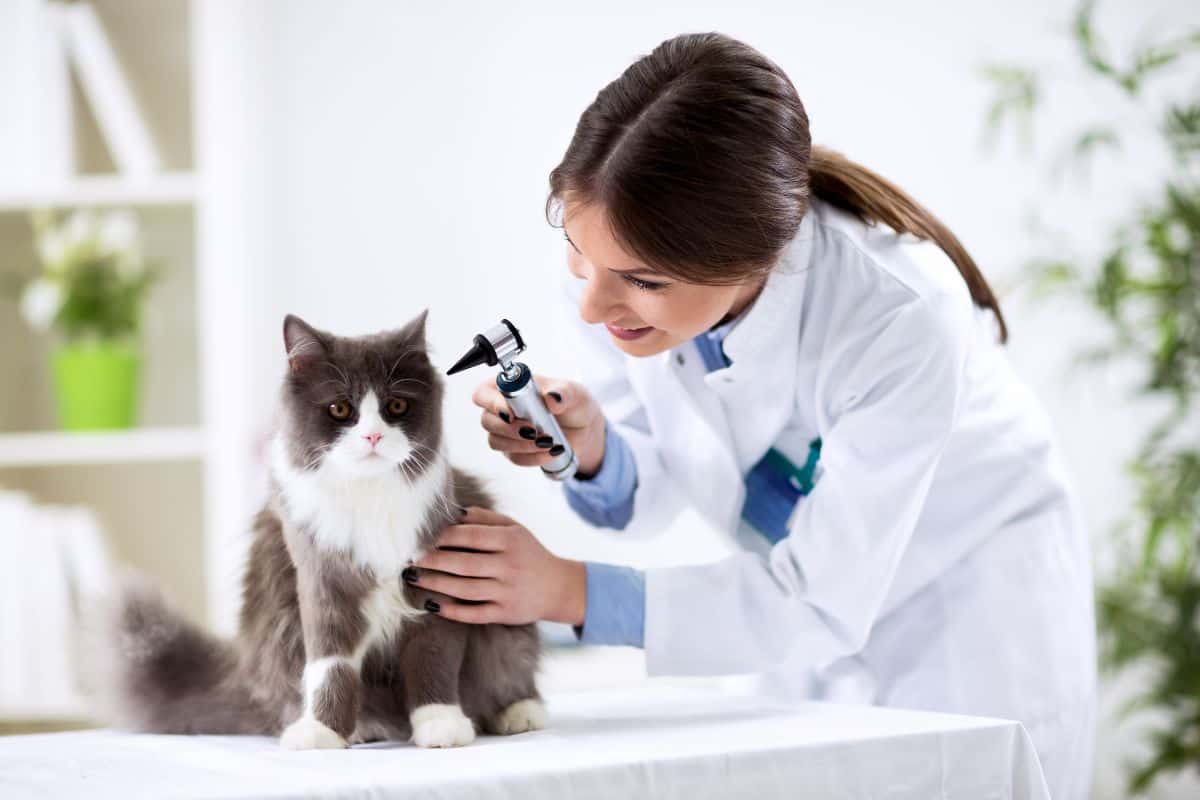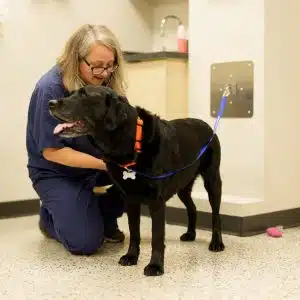Comprehensive Guide to the Providers Offered by a Vet Oncologist
Vet oncology encompasses a vast selection of services focused on detecting and dealing with cancer cells in animals. Veterinary Cancer Specialist. Oncologists utilize sophisticated diagnostic methods and use various therapy options customized to each animal's demands. They also prioritize helpful treatment and supply important sources for pet dog owners. Recognizing these services is important for making informed decisions. What certain aspects of vet oncology can notably impact a family pet's treatment trip?
Comprehending Vet Oncology
Veterinary oncology is a customized area concentrated on treating and detecting cancer cells in pets. This discipline includes a large range of approaches, from clinical treatments such as radiation treatment and immunotherapy to surgical treatments aimed at eliminating tumors. Veterinary oncologists are trained to identify the unique manifestations of cancer cells in different species, enabling them to tailor treatment plans to individual clients.
In enhancement to traditional therapies, veterinary oncology stresses encouraging care, which plays an important role in enhancing the lifestyle for afflicted pets. This includes pain monitoring, dietary support, and palliative care alternatives. Cooperation with pet owners is critical, as they are integral to decision-making concerning their family pets' therapy courses. As study advancements, veterinary oncology proceeds to progress, supplying brand-new hope and enhanced outcomes for family pets identified with cancer. Overall, this field is fundamental for dealing with the complexities of cancer cells in buddy pets.
Advanced Diagnostic Techniques
Advanced analysis methods play a crucial role in veterinary oncology, providing crucial understandings right into the presence and level of cancer in pets. Imaging modalities such as ultrasound, CT scans, and MRI are typically employed to imagine tumors and examine their attributes. Furthermore, biopsy treatments are very important for getting cells examples, permitting definitive medical diagnosis and customized treatment plans.
Imaging Modalities Utilized
Imaging modalities play an important function in the medical diagnosis and monitoring of cancer in pets. Vet oncologists make use of different innovative imaging methods to assess lump transition, size, and visibility. Radiography, or X-rays, uses a preliminary view of bone and breast conditions, while ultrasound provides real-time imaging of soft cells, allowing for detailed assessment of interior body organs. Computed tomography (CT) boosts visualization of complicated physiological structures and makes it possible for 3D repairs, assisting in precise tumor localization. Magnetic resonance imaging (MRI) is important for soft tissue differentiation, specifically in brain tumors. Additionally, nuclear medicine techniques such as positron discharge tomography (PET DOG) help recognize metabolic activity within growths. Collectively, these methods boost diagnostic accuracy, assisting effective therapy techniques for oncological clients.
Biopsy Procedures Explained
Complying with the preliminary assessment with imaging modalities, getting a conclusive medical diagnosis commonly requires cells tasting with biopsy treatments. Veterinary oncologists utilize various biopsy methods based upon the lump's location and characteristics. Great needle goal (FNA) is a minimally invasive technique that draws out cells for cytological examination, suitable for superficial masses. Core needle biopsies supply bigger tissue examples and work for much deeper lumps, enabling histopathological analysis. Surgical biopsies involve excising a section or the whole tumor, facilitating complete examination. These procedures not only validate the presence of cancer yet also help determine its type and grade, directing therapy decisions. Each biopsy strategy is picked thoroughly to balance diagnostic precision with patient safety and comfort.
Therapy Options for Cancer in Pet dogs
When an animal is diagnosed with cancer, a variety of therapy alternatives appear to help improve and handle the illness lifestyle. Vet oncologists usually suggest a multidisciplinary technique customized to the private family pet's needs, which may consist of surgery, radiation therapy, immunotherapy, or alternative therapies.
Surgical treatment is often used to eliminate tumors and damaged tissues, possibly leading to full remission in many cases. Radiation therapy aims to ruin and target cancer cells, reducing tumor dimension and relieving signs - Pet Cancer Surgery. Immunotherapy uses the family pet's immune system to eliminate cancer cells better, while different treatments could include acupuncture or organic supplements to support general health
Each therapy option brings its own benefits and threats, and veterinary oncologists function carefully with pet dog proprietors to develop a detailed strategy that straightens with the animal's certain medical diagnosis and the proprietor's wishes. The best goal is to boost the family pet's convenience and lifestyle throughout their cancer trip.
Chemotherapy for Pets
Chemotherapy is a common therapy alternative for animals identified with cancer and is commonly utilized combined with various other treatments laid out by vet oncologists. This treatment entails the management of details medicines created to damage and target cancer cells, thereby minimizing tumor dimension and protecting against the spread of the disease. Veterinary oncologists customize radiation treatment procedures based upon the sort of cancer, the pet dog's general health, and the wanted treatment click here now end result.
Negative effects can happen, as these drugs might additionally affect healthy and balanced cells. Common reactions include queasiness, vomiting, and temporary modifications in appetite - Veterinary Oncologist. Vet oncologists are equipped to take care of these negative effects efficiently, making sure the animal's convenience throughout the treatment process. Normal monitoring via blood tests and follow-up visits is vital to analyze the pet's response to chemotherapy and make essential adjustments. Inevitably, chemotherapy can offer substantial benefits, improving the lifestyle for animals encountering cancer cells diagnoses

Radiation Treatment in Vet Medicine
Radiation treatment acts as a reliable treatment alternative for family pets diagnosed with localized growths, using a targeted approach to cancer monitoring. This method utilizes high-energy radiation to harm the DNA of cancer cells, inhibiting their capacity to proliferate. It is especially helpful for tumors that are not responsive to surgical elimination or for cases where surgical procedure may not be viable as a result of the tumor's place.
Vet oncologists tailor radiation methods based on growth size, type, and area, as well as the family pet's helpful hints total health. Treatment can be supplied via outside beam of light radiation or brachytherapy, each with distinct advantages. Normally, numerous sessions are required to make best use of effectiveness while lessening adverse effects.
Although pet dogs may experience momentary responses such as skin irritation, the overall goal is to reduce tumors and relieve symptoms, ultimately improving the animal's diagnosis and lifestyle. Accordingly, radiation therapy plays a vital function in complete cancer treatment.
Palliative Treatment and Lifestyle
Palliative treatment in veterinary oncology focuses on enhancing the lifestyle for animals encountering incurable ailments, making certain convenience and dignity in their final days. This specialized approach prioritizes pain management, symptom control, and psychological assistance. Veterinary oncologists assess each pet dog's specific needs, customizing treatments to ease discomfort and improve total wellness.
Techniques may include carrying out drugs for pain relief, taking care of queasiness, and addressing other upsetting signs and symptoms. Furthermore, nutritional assistance is typically offered to keep stamina and enhance appetite. The emotional facet of palliative treatment is equally vital; developing a calm setting helps in reducing anxiety for both family pet and owner.
Inevitably, the objective of palliative care is to permit animals to appreciate their staying time with as much pleasure and self-respect as feasible. By focusing on comfort and lifestyle, veterinary oncologists play an essential function in ensuring that family pets and their families browse this difficult trip with compassion and understanding.
Support for Pet Dog Owners During Treatment

Psychological Guidance for Proprietors
Charting the emotional landscape throughout a pet's cancer therapy can be an overwhelming experience for owners. The unpredictability surrounding medical diagnosis and diagnosis can result in sensations of helplessness, stress and anxiety, and sadness. Veterinary oncologists acknowledge the relevance of emotional support visit this site and usually provide support to aid proprietors navigate this challenging trip. Communication is essential; going over therapy alternatives and potential outcomes can minimize some anxieties. In addition, offering peace of mind that emotional actions are legitimate fosters an encouraging environment. Many oncology clinics may also suggest support system or counseling services tailored for animal owners, helping with shared experiences. Motivating owners to prioritize self-care during this time around is important, as their psychological wellness straight influences their family pet's convenience and general treatment experience.

Resources and Educational Products
Guiding via the complexities of an animal's cancer therapy can be frightening for owners, making access to dependable sources and academic materials essential. Vet oncologists typically supply a variety of handouts, brochures, and online products that describe treatment options, possible adverse effects, and treatment approaches. These resources help empower and demystify the process family pet owners to make enlightened decisions. Additionally, numerous oncology centers supply access to sustain groups and discussion forums where proprietors can get in touch with others encountering comparable difficulties, cultivating a feeling of community. Educational workshops and webinars carried out by vet experts even more boost understanding, making sure that proprietors are fully equipped to browse their pet dog's journey via cancer treatment with self-confidence and knowledge.
Often Asked Concerns
Exactly How Can I Prepare My Animal for a Vet Oncology Check Out?
Preparing a pet dog for a veterinary oncology go to involves event clinical records, noting signs, and making certain the pet is comfy. A tranquil demeanor and familiar items can aid ease stress and anxiety during the consultation.
What Are the Indicators My Animal May Have Cancer Cells?
Indicators that a pet may have cancer include unexplained weight reduction, relentless throwing up or looseness of the bowels, uncommon lumps or swellings, lethargy, changes in cravings, difficulty breathing, and modifications in behavior. Trigger veterinary attention is vital.
Just How Can I Support My Family Pet Psychologically Throughout Therapy?
Sustaining an animal emotionally throughout therapy includes giving convenience, keeping routines, offering mild love, and making certain a calm atmosphere. Involving in silent play and routine companionship assists relieve tension and fosters a complacency.
Exist Different Treatments for Pets With Cancer cells?
Different treatments for pets with cancer cells consist of acupuncture, organic therapies, and nutritional assistance. These methods may enhance traditional therapies, promoting overall well-being. Consulting with a vet is crucial for risk-free and efficient integration of different therapies.
What Prices Should I Expect for Veterinary Oncology Services?
The expected prices for vet oncology services can vary considerably, typically affected by diagnostics, treatments, and continuous care. Animal proprietors ought to plan for expenditures varying from consultations to specialized therapies, mirroring the complexity of cancer administration.
Collaboration with animal owners is crucial, as they are important to decision-making concerning their family pets' treatment paths. Each therapy choice carries its own advantages and risks, and vet oncologists work very closely with animal proprietors to design a detailed plan that lines up with the family pet's specific diagnosis and the proprietor's dreams. Pets might experience temporary responses such as skin irritability, the overall objective is to shrink lumps and relieve signs, inevitably enhancing the pet dog's diagnosis and top quality of life. Assistance for pet dog owners during treatment is vital in steering through the emotional difficulties associated with a pet's cancer medical diagnosis. Preparing a pet for a vet oncology see entails celebration clinical documents, keeping in mind symptoms, and guaranteeing the family pet is comfortable.